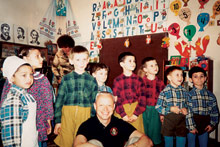What’s a crazy sailor doing in a landlocked country like Moldova?

It’s a question that sometimes comes to mind when Ray West talks about the work of the Moldova World Children’s Fund, he says jokingly. The Hendersonville-based nonprofit works in Europe’s poorest country, and the answer is: helping children.
West first visited the former Soviet republic in 1998, when he was recruited to manage a humanitarian-assistance program there. At the time, West was working as vice president of Kanuga conference center and commanding a Naval Reserve unit in Greenville, S.C., and the U.S. military tapped him to oversee a pair of projects: completing construction of an orphanage and repairing a hospital.
Visiting the orphanage’s empty shell in Drochia made a lasting impression, says West. “I sat down at their kitchen table that was just about as bleak as you can imagine,” he recalls. “I was sitting there, looking across the table at this guy and his wife doing something far greater than anything I had ever attempted, and I felt that I was somehow at the right place at the right time.”
But there was a problem: The “orphanage” was actually the private home of a local couple who’d taken in eight older children—the kind often passed up for adoption—and then realized they needed help caring for them all. The U.S. government, however, is not allowed to spend taxpayers’ money on private residents, so West says he had to cancel the project, “and that just tore me up.”
After West returned home, though, the story of the orphanage got around, and friends and family soon began making donations. The orphanage was built, and since then, the Moldova World Children’s Fund has provided seed for gardens, built sheds for livestock, supplied indoor plumbing and provided financial help so children can attend technical school or college.
West says his group looks for ways to team up with U.S. government projects, as well as other aid groups, to get the biggest bang for the buck. Government funding, he notes, can take a project only so far, and it’s often limited to basic infrastructure.
“I realized I could take a $200,000 project to fruition essentially for pennies on the dollar,” West explains. “I really liked that return on investment, and so did some of our donors. We’re able to leverage money and provide that missing link.” In one case, for example, the government provided money to build a hospital but no funding for equipment.
Incorporated as a 501(c)(3) nonprofit in 2006) the Moldova World Children’s Fund has a budget of about $150,000 a year, all of it from donations. The board (chaired by Albert S. Gooch Jr., who helped found the organization), has a strong educational focus. Accordingly, the group has provided financial aid for Moldovan children, enabling them to attend summer camps as well as vocational schools and universities. The nonprofit has also paid for public-school repairs and hundreds of computers for schools and orphanages.
Helping children receive a good education in their home country will increase “the likelihood that a student will stay in Moldova” and help it prosper, rather than emigrating, says West.
Info: Moldova World Children’s Fund, P.O. Box 548, Hendersonville NC 28793-0548 (828-551-8209; www.moldovawcf.org).



ladies and gentlemen
you could not tell in detail how much money was received by you from donations and how much was spent on children from Moldova. Just interested in why you do not have any Moldovan contacts?